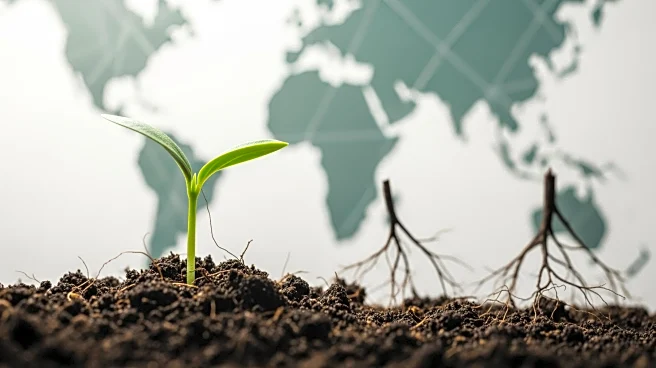What's Happening?
The International Seed Federation (ISF) is advocating for the role of seed innovation in climate resilience at the upcoming COP30 in Brazil. Seeds are highlighted as a crucial element in adapting agriculture to climate change, with improved plant varieties
offering solutions for drought tolerance, disease resistance, and efficient resource use. ISF aims to emphasize the importance of seeds in building resilient food systems and supporting farmer livelihoods. The organization is calling for policy frameworks that support seed innovation and global trade, aligning international standards to facilitate the movement of seeds across borders.
Why It's Important?
As global food demand rises and climate risks threaten agriculture, seed innovation becomes vital for ensuring food security and sustainable farming practices. By focusing on seeds, ISF seeks to address the climate funding gap and promote agricultural resilience. This initiative could lead to increased investment in seed technology, benefiting farmers, especially in regions vulnerable to climate extremes. The emphasis on seeds at COP30 highlights the growing recognition of agriculture's role in climate policy, potentially influencing future international agreements and funding priorities.
What's Next?
ISF plans to collaborate with governments, seed companies, and financial institutions to drive action in policy engagement, supply chain alignment, and finance. The organization will advocate for smart regulation and public-private partnerships to support seed innovation. COP30 presents an opportunity to showcase the potential of seeds in meeting climate targets, with ISF aiming to secure commitments for increased investment in seed technology. The outcomes of COP30 could shape global agricultural policies and funding strategies, impacting farmers and food systems worldwide.
Beyond the Headlines
The focus on seeds at COP30 underscores the interconnectedness of agriculture, climate policy, and global food security. It highlights the need for integrated approaches that consider local realities and global solutions. The initiative also raises ethical considerations about the accessibility of seed technology and the protection of intellectual property rights in agriculture.
















